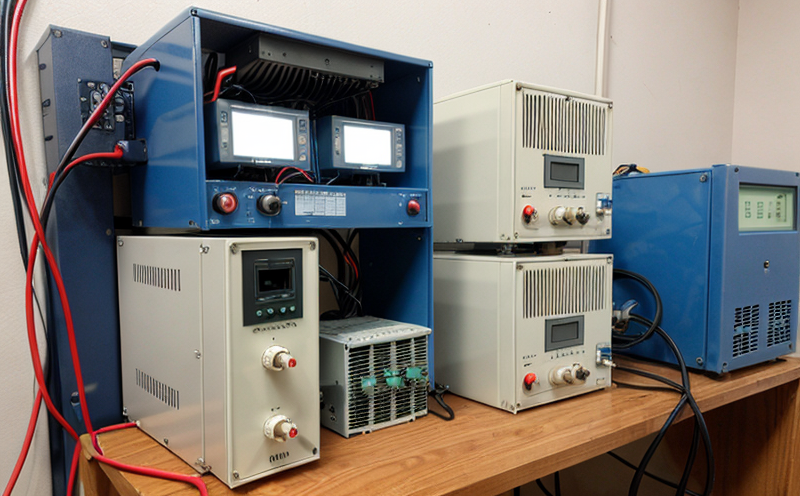IEC 61439 Low Voltage Switchgear Testing for Railway Use
The IEC (International Electrotechnical Commission) Standard 61439 is a critical guideline for the design, manufacture, and testing of low voltage switchgear intended for railway use. This standard ensures that equipment used in this environment meets stringent safety and performance criteria necessary to protect passengers, crew members, and infrastructure from electrical hazards.
Low voltage switchgear plays an essential role in power distribution within railway systems. It is responsible for the safe transfer of electricity from the main supply lines to various parts of the train and its auxiliary equipment such as lighting, heating, and communication systems. Given the challenging operating conditions that railways face—such as varying environmental factors, vibrations, and potential electrical surges—it's crucial that switchgear adheres strictly to international standards.
Compliance with IEC 61439 not only ensures the reliability of railway operations but also enhances passenger safety by mitigating risks associated with electrical faults. This standard covers tests related to mechanical strength, insulation performance, electromagnetic compatibility (EMC), and protection against overcurrents and undervoltages.
Our laboratory employs state-of-the-art equipment and highly skilled engineers who specialize in testing low voltage switchgear according to IEC 61439. We use specialized test rigs designed specifically for railway applications, ensuring accurate and reliable results. Our tests include but are not limited to:
- Insulation resistance measurement
- Withstand voltage testing
- Overcurrent protection assessment
- Electromagnetic interference (EMI) evaluation
- Vibration tolerance tests
- Ingress protection classification verification
The process begins with thorough preparation of the switchgear specimens, ensuring they are clean and free from any external contaminants that could affect test outcomes. Once prepared, our technicians conduct a series of comprehensive tests to assess various aspects of performance. The results are meticulously recorded and analyzed before being compiled into detailed reports.
These reports serve multiple purposes; they provide manufacturers with valuable insights into how their products perform under specified conditions and help regulatory bodies verify compliance with relevant international standards like IEC 61439. For quality managers, compliance officers, R&D engineers, and procurement personnel involved in railway projects, these reports offer assurance regarding the safety and reliability of the switchgear used.
By adhering to strict testing protocols outlined by IEC 61439, we contribute significantly towards maintaining high standards across the global railway industry. Our services play a vital role in supporting continuous improvement initiatives aimed at enhancing operational efficiency while ensuring passenger safety remains paramount.
Scope and Methodology
The scope of IEC 61439 testing encompasses several key areas critical to the performance and reliability of low voltage switchgear in railway applications. These tests are designed to evaluate the electrical, mechanical, and environmental robustness required for safe operation under challenging conditions.
Electrical tests focus on verifying insulation resistance levels, ensuring adequate protection against overcurrents, assessing electromagnetic compatibility (EMC), and checking the capability of the switchgear to withstand specified voltage surges without failure. Mechanical tests assess structural integrity through vibration tolerance assessments and impact strength evaluations.
Environmental testing includes evaluating ingress protection ratings, humidity resistance capabilities, and temperature cycling effects on performance parameters. Additionally, we perform short circuit current tests to ensure that the switchgear can safely interrupt fault currents within prescribed limits without damage or degradation.
The methodology employed in our laboratory adheres closely to IEC 61439 guidelines ensuring consistency across all test procedures. Our team uses advanced instrumentation and software tools calibrated specifically for railway applications, guaranteeing precise measurements throughout every stage of testing.
Our approach also emphasizes the importance of replicating real-world operating conditions as closely as possible during testing. This involves simulating environmental factors such as temperature fluctuations, humidity levels, and mechanical stresses that may be encountered in actual service environments. By doing so, we ensure that our test results accurately reflect expected field performance.
Our commitment to accuracy extends beyond just meeting the requirements set forth by IEC 61439; we strive for excellence by exceeding expectations whenever possible. Our rigorous quality control measures and comprehensive reporting ensure complete transparency regarding every aspect of the testing process, providing clients with confidence in their decisions based on reliable data.
Industry Applications
- Testing switchgear for traction substations that supply power to electric trains
- Evaluating auxiliary equipment like lighting fixtures and communication systems powered by railway low voltage supplies
- Assessing safety features in emergency power distribution units installed onboard rolling stock
- Verifying the durability of switchgear components exposed to harsh weather conditions along railway lines
- Evaluating interlock mechanisms ensuring proper coordination between different sections of the railway network
Customer Impact and Satisfaction
We understand that our customers value more than just compliance with standards; they seek assurance that their investments will perform reliably in demanding environments. By offering IEC 61439 testing services, we provide peace of mind knowing that the switchgear used on railway projects meets rigorous international specifications.
Our approach ensures not only regulatory satisfaction but also enhances brand reputation by demonstrating commitment to quality and safety standards. This is particularly important for companies involved in large-scale infrastructure projects where stakeholder trust plays a crucial role in project success.
Feedback from our clients highlights the value they place on receiving detailed reports that go beyond mere pass/fail outcomes, offering practical suggestions for improvement whenever necessary. Their satisfaction reflects the importance we attach to providing comprehensive support throughout the entire testing process.





